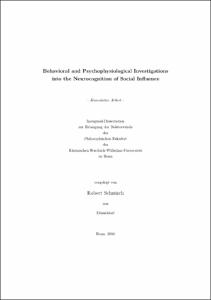Schnürch, Robert: Behavioral and Psychophysiological Investigations into the Neurocognition of Social Influence. - Bonn, 2016. - Dissertation, Rheinische Friedrich-Wilhelms-Universität Bonn.
Online-Ausgabe in bonndoc: https://nbn-resolving.org/urn:nbn:de:hbz:5-45206
Online-Ausgabe in bonndoc: https://nbn-resolving.org/urn:nbn:de:hbz:5-45206
@phdthesis{handle:20.500.11811/6807,
urn: https://nbn-resolving.org/urn:nbn:de:hbz:5-45206,
author = {{Robert Schnürch}},
title = {Behavioral and Psychophysiological Investigations into the Neurocognition of Social Influence},
school = {Rheinische Friedrich-Wilhelms-Universität Bonn},
year = 2016,
month = nov,
note = {Human behavior and experience is far from independent; social norms, conveying what is typical and appropriate in a given social group, thoroughly mold what we do, think, and feel. While much is known about the motivational mechanisms of social influence based on group norms, researchers have begun to decipher its neurocognitive principles only recently. In this thesis, I provide a brief introduction into psychological investigations of social influence and recently emerging neuroscientific research in this field. Moreover, I extend previous findings and preliminary theories on the basis of eight original publications, which include one review article, one behavioral study, and six studies employing event-related brain potentials (ERPs). Upon reviewing the existent literature, I have proposed that norm-based social influence involves two core processes: (i) the differentiation of social proof and deviance in neural circuits coding behavioral outcomes, and (ii) the direct modulation of the neural representations of to-be-judged features. Moreover, my colleagues and I have tested and clarified the validity of a common behavioral measure of conformity as well as the functional significance of ERP components relevant to the investigation of outcome processing and sustained attention. Most importantly, we have built upon our synthesis of the literature and our methodological studies and provide conclusive findings that confirm and extend the proposed accounts of social influence. We demonstrate that the differentiation of norms that confirm or contradict the individual's own views—thus constituting social proof or conveying social deviance, respectively—engages both early and late processes of attentional prioritization. Episodes of social proof, as well as stimuli associated with it, take precedence over those related to deviance. This finding is replicated across different samples, tasks, and paradigms. We propose that social norms feed into basic cognitive processes, similar to the value-informed deployment of attentional resources. As a whole, my series of research corroborates the notion that social influence is based upon some of our general cognitive faculties, such as outcome valuation and reinforcement learning, and can entail modulations of even the most fundamental functions, such as perception and attention. This could explain the pervasiveness of social influence on human behavior and experience, and it speaks to the timeliness and relevance of exploring its neurocognitive foundations.},
url = {https://hdl.handle.net/20.500.11811/6807}
}
urn: https://nbn-resolving.org/urn:nbn:de:hbz:5-45206,
author = {{Robert Schnürch}},
title = {Behavioral and Psychophysiological Investigations into the Neurocognition of Social Influence},
school = {Rheinische Friedrich-Wilhelms-Universität Bonn},
year = 2016,
month = nov,
note = {Human behavior and experience is far from independent; social norms, conveying what is typical and appropriate in a given social group, thoroughly mold what we do, think, and feel. While much is known about the motivational mechanisms of social influence based on group norms, researchers have begun to decipher its neurocognitive principles only recently. In this thesis, I provide a brief introduction into psychological investigations of social influence and recently emerging neuroscientific research in this field. Moreover, I extend previous findings and preliminary theories on the basis of eight original publications, which include one review article, one behavioral study, and six studies employing event-related brain potentials (ERPs). Upon reviewing the existent literature, I have proposed that norm-based social influence involves two core processes: (i) the differentiation of social proof and deviance in neural circuits coding behavioral outcomes, and (ii) the direct modulation of the neural representations of to-be-judged features. Moreover, my colleagues and I have tested and clarified the validity of a common behavioral measure of conformity as well as the functional significance of ERP components relevant to the investigation of outcome processing and sustained attention. Most importantly, we have built upon our synthesis of the literature and our methodological studies and provide conclusive findings that confirm and extend the proposed accounts of social influence. We demonstrate that the differentiation of norms that confirm or contradict the individual's own views—thus constituting social proof or conveying social deviance, respectively—engages both early and late processes of attentional prioritization. Episodes of social proof, as well as stimuli associated with it, take precedence over those related to deviance. This finding is replicated across different samples, tasks, and paradigms. We propose that social norms feed into basic cognitive processes, similar to the value-informed deployment of attentional resources. As a whole, my series of research corroborates the notion that social influence is based upon some of our general cognitive faculties, such as outcome valuation and reinforcement learning, and can entail modulations of even the most fundamental functions, such as perception and attention. This could explain the pervasiveness of social influence on human behavior and experience, and it speaks to the timeliness and relevance of exploring its neurocognitive foundations.},
url = {https://hdl.handle.net/20.500.11811/6807}
}






